现在完成时态(1)
外研版八年级英语下册单元语法专练-Module2语法-现在完成时(1)
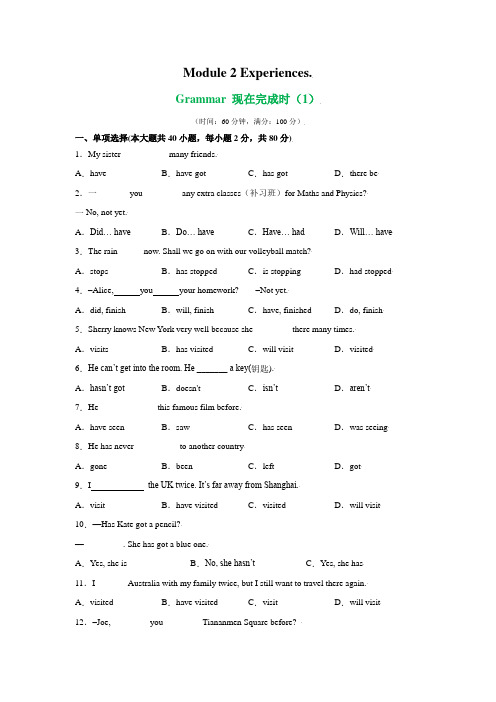
Module 2 Experiences.Grammar 现在完成时(1)(时间:60分钟,满分:100分)一、单项选择(本大题共40小题,每小题2分,共80分)1.My sister __________ many friends.A.have B.have got C.has got D.there be 2.一_______ you ________ any extra classes(补习班)for Maths and Physics?一No, not yet.A.Did… have B.Do… have C.Have… had D.Will… have 3.The rain _____ now. Shall we go on with our volleyball match?A.stops B.has stopped C.is stopping D.had stopped 4.–Alice, _ you _ your homework?–Not yet.A.did, finish B.will, finish C.have, finished D.do, finish 5.Sherry knows New York very well because she ________ there many times. A.visits B.has visited C.will visit D.visited 6.He can’t get into the room. He _______ a key(钥匙).A.hasn’t got B.doesn't C.isn’t D.aren’t 7.He _____________this famous film before.A.have seen B.saw C.has seen D.was seeing 8.He has never__________ to another countryA.gone B.been C.left D.got9.I the UK twice. It’s far away from Shanghai.A.visit B.have visited C.visited D.will visit 10.—Has Kate got a pencil?—_________. She has got a blue one.A.Yes, she is B.No, she hasn’t C.Yes, she has11.I _______Australia with my family twice, but I still want to travel there again. A.visited B.have visited C.visit D.will visit 12.–Joe, ________ you ________ Tiananmen Square before?--Yes, I have.A.do, visit B.did, visit C.have, visited D.are, visiting 13.—Would you like some more tea?—No, thanks. I ________ enough.A.have had B.had C.have D.am having 14.Let's go shopping for food and drink. Now, we any meat.A.haven't got B.have got C.got D.hasn't got 15.Jack Toronto twice. He likes this city.A.has visited B.visited C.visits D.will visit 16.— How long_________ you_________ this dictionary?—Only two days.A.have; bought B.have; had C.did, buy D.did, have 17.A: Have you _______ to your mother? B: No, not yet.A.write B.wrote C.writen D.written18.I like travelling very much. I the Great Wall twice.A.will visit B.visit C.visited D.have visited 19.—Has she got any juice?—________.A.Yes, she is B.There is some juice C.No, she hasn’t D.Yes, she can 20.I ________ about the UK. It’s far away from China.A.read B.have read C.am reading D.will read 21.—_______ we got any beef in the fridge?—No, we haven’t. Let’s go shopping to buy some.A.Do B.Have C.Are22.Have you ________ your new classmates yet?A.had friends with B.made friend with C.got friend to D.made friends with 23.—Hi, David! ________ you got ________ postcards of Europe?—Yes, I have.A.Do; any B.Has; some C.Have; any D.Do; some 24.Mum, let’s go shopping for food and drink. Now, we _______ any orange juice.A.haven’t got B.have got C.get D.don’t get 25.Tony, let's go shopping for food and drink. Now, we ___________ any meat. A.haven't got B.have got C.hasn't go D.are not 26.Maybe Tom ________ his work. The light in his room is still on.A.doesn’t finish B.didn’t finish C.won’t finish D.hasn’t finished 27.—Monica, you ________ the exam! Congratulations!—Thank you! I can’t believe my ears.A.pass B.have passed C.will pass D.passed 28.Linda ________ her breakfast. She isn’t hungry now.A.is eating B.ate C.will eat D.has eaten 29.— ________ you ________ the movie Lost in Hong Kong?—No, I haven’t.A.Have; seen B.Are; seeing C.Did; see D.Will; see 30.Linda ________ this book, so she knows it very well.A.is reading B.reads C.was reading D.has read 31.—Have you visited the Great Wall?—_______. I visited it last summer.A.Yes, I did B.Yes, I have C.Not yet32.Paula is happy that she ________ her lost watch.A.finds B.is finding C.has found D.will find 33.I can’t find my notebook anywhere. I’m afraid I ____________ it.A.lose B.lost C.have lost D.was losing 34.—Where are the flowers?—You see, someone ____________ them to the windows.A.moves B.had moved C.has moved D.would move 35.The Monkey King has ________ the children of China for many years.A.exciting B.excite C.excited D.excites 36.I ________ half of the English novel, and I’ll try to finish it at the weekend.A.read B.have read C.am reading D.will read 37.That's an interesting movie. I ________ it twice.A.watch B.watches C.watched D.have watched 38.His concert is so fantastic and the tickets have ______.A.sell B.sold C.sell out D.sold out 39.Great changes have ______ in my home town.A.happen B.take place C.happened D.taken place 40.---Have you ever _____ the Great Wall?---Yes, I have.A.see B.saw C.seen D.seeing二、用所给单词的正确形式填空(本大题共10小题,每小题2分,共20分) 41.Have you ________ (see) the robots in the museum?42.Have you ________ (hear) of the CD yet?43.___________ you ___________ (read) Gone with the Wind yet?44.Over 200 students have ______ (enter) the hand-writing competition.45.So much dirty water has __________ (pollute) the river in my hometown. 46.—Why are you so happy today?—Because I ________ (win) the badminton match.47.This movie has ________ (touch) everyone in the cinema.48.I ________ (see) the film Detective Chinatown 3 (唐人街探案3) twice. It’s so exciting. 49.Someone________(clean) the classroom. Look! How clean it now!50.—It's the second time I have come to Xiamen. It ________ (change) a lot.—Yes, it's more and more beautiful.参考答案:1.C【解析】【详解】句意:我的姐姐交了很多朋友。
(英语)高中英语现在完成进行时(一)解题方法和技巧及练习题
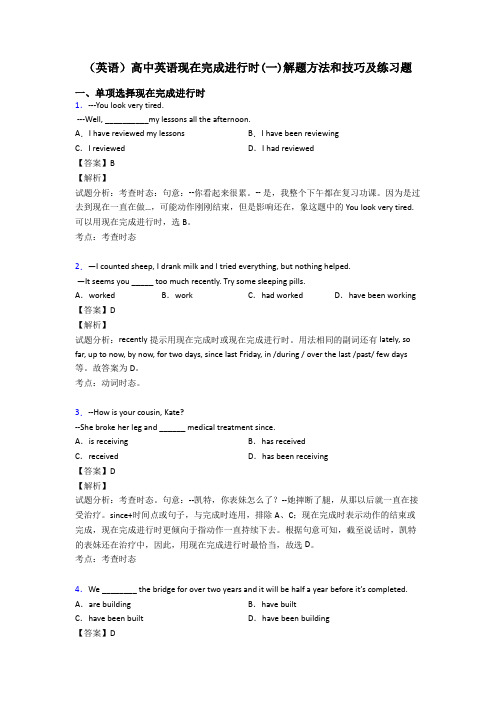
(英语)高中英语现在完成进行时(一)解题方法和技巧及练习题一、单项选择现在完成进行时1.---You look very tired.---Well, __________my lessons all the afternoon.A.I have reviewed my lessons B.I have been reviewingC.I reviewed D.I had reviewed【答案】B【解析】试题分析:考查时态:句意:--你看起来很累。
-- 是,我整个下午都在复习功课。
因为是过去到现在一直在做…,可能动作刚刚结束,但是影响还在,象这题中的You look very tired.可以用现在完成进行时,选B。
考点:考查时态2.—I counted sheep, I drank milk and I tried everything, but nothing helped.—It seems you _____ too much recently. Try some sleeping pills.A.worked B.work C.had worked D.have been working 【答案】D【解析】试题分析:recently提示用现在完成时或现在完成进行时。
用法相同的副词还有lately, so far, up to now, by now, for two days, since last Friday, in /during / over the last /past/ few days 等。
故答案为D。
考点:动词时态。
3.--How is your cousin, Kate?--She broke her leg and ______ medical treatment since.A.is receiving B.has receivedC.received D.has been receiving【答案】D【解析】试题分析:考查时态。
现在完成时讲解及练习题(含答案)[1]
![现在完成时讲解及练习题(含答案)[1]](https://img.taocdn.com/s3/m/0132335bfd0a79563d1e72d7.png)
现在完成时讲解及练习题(含答案)(word版可编辑修改)编辑整理:尊敬的读者朋友们:这里是精品文档编辑中心,本文档内容是由我和我的同事精心编辑整理后发布的,发布之前我们对文中内容进行仔细校对,但是难免会有疏漏的地方,但是任然希望(现在完成时讲解及练习题(含答案)(word版可编辑修改))的内容能够给您的工作和学习带来便利。
同时也真诚的希望收到您的建议和反馈,这将是我们进步的源泉,前进的动力。
本文可编辑可修改,如果觉得对您有帮助请收藏以便随时查阅,最后祝您生活愉快业绩进步,以下为现在完成时讲解及练习题(含答案)(word版可编辑修改)的全部内容。
时态讲解:现在完成时(1)构成:现在完成时由助动词have + 过去分词构成,助动词have 有人称和数的变化.第三人称单数用has,其余用have.现在完成时的否定式直接在助动词后面加上not、疑问式是把助动词提到主语之前。
以study 为例,其否定式、疑问式和简单回答形式如下:(2)用法:1)现在完成时通常表示在说话之前已经完成的动作或存在的状态。
说话人强调的是该动作或状态对现在的结果或影响.My daughter has just gone out. 我女儿刚出去。
I’m sure we’ve met before。
我肯定我们以前见过面。
She has arrived。
她到了。
2)表示持续到现在的动作或状态,往往和包括现在在内的表示一段时间的状语连用,如recently, already, just, lately,for…, since…,yet等。
如:I haven’t heard from her these days。
这些日子我没有收到她的信。
We haven’tseen you recently。
最近我们没有见到你。
They have been away for two years。
他们离开已经两年了。
She has been withus since Monday。
现在完成时练习题及答案(老师专用) (1)
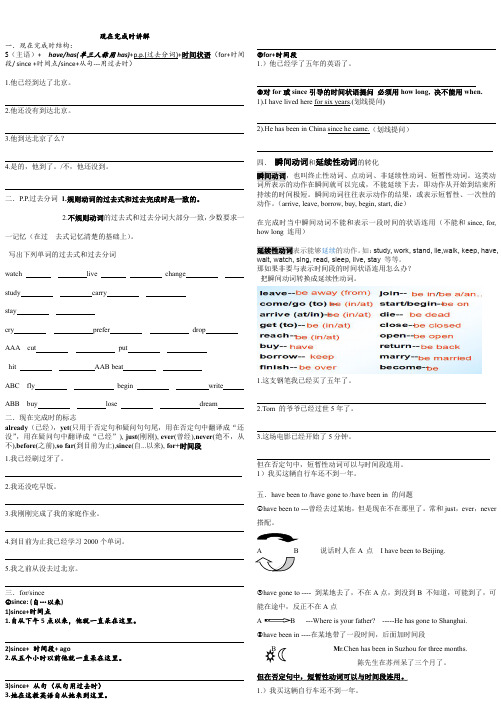
现在完成时讲解一.现在完成时结构:S(主语)+have/has(单三人称用has)+p.p.(过去分词)+时间状语(for+时间段/since+时间点/since+从句---用过去时)1.他已经到达了北京。
2.他还没有到达北京。
3.他到达北京了么?4.是的,他到了。
/不,他还没到。
二.P.P.过去分词1.规则动词的过去式和过去完成时是一致的。
2.不规则动词的过去式和过去分词大部分一致,少数要求一一记忆(在过去式记忆清楚的基础上)。
写出下列单词的过去式和过去分词watch live changestudy carrystaycry prefer dropAAA cut puthit AAB beatABC fly begin write ABB buy lose dream二.现在完成时的标志already(已经),yet(只用于否定句和疑问句句尾,用在否定句中翻译成“还没”,用在疑问句中翻译成“已经”),just(刚刚),ever(曾经),never(绝不,从不),before(之前),so far(到目前为止),since(自...以来),for+时间段1.我已经刷过牙了。
2.我还没吃早饭。
3.我刚刚完成了我的家庭作业。
4.到目前为止我已经学习2000个单词。
5.我之前从没去过北京。
三.for/since①since:(自…以来)1)since+时间点1.自从下午5点以来,他就一直呆在这里。
2)since+时间段+ago2.从五个小时以前他就一直呆在这里。
3)since+从句(从句用过去时)3.她在这教英语自从她来到这里。
②for+时间段1.)他已经学了五年的英语了。
③对for或since引导的时间状语提问必须用how long,决不能用when.1).I have lived here for six years.(划线提问)2).He has been in China since he came.(划线提问)四.瞬间动词和延续性动词的转化瞬间动词,也叫终止性动词、点动词、非延续性动词、短暂性动词。
16种时态的英语表达
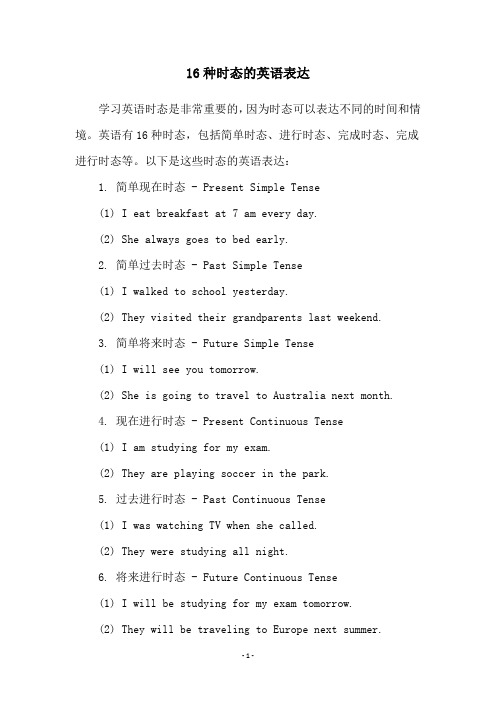
16种时态的英语表达学习英语时态是非常重要的,因为时态可以表达不同的时间和情境。
英语有16种时态,包括简单时态、进行时态、完成时态、完成进行时态等。
以下是这些时态的英语表达:1. 简单现在时态 - Present Simple Tense(1) I eat breakfast at 7 am every day.(2) She always goes to bed early.2. 简单过去时态 - Past Simple Tense(1) I walked to school yesterday.(2) They visited their grandparents last weekend.3. 简单将来时态 - Future Simple Tense(1) I will see you tomorrow.(2) She is going to travel to Australia next month.4. 现在进行时态 - Present Continuous Tense(1) I am studying for my exam.(2) They are playing soccer in the park.5. 过去进行时态 - Past Continuous Tense(1) I was watching TV when she called.(2) They were studying all night.6. 将来进行时态 - Future Continuous Tense(1) I will be studying for my exam tomorrow.(2) They will be traveling to Europe next summer.7. 现在完成时态 - Present Perfect Tense(1) I have eaten breakfast already.(2) She has seen that movie twice.8. 过去完成时态 - Past Perfect Tense(1) I had finished my homework before dinner.(2) They had already left when we arrived.9. 将来完成时态 - Future Perfect Tense(1) I will have finished my project by next week.(2) She will have studied English for five years by next month.10. 现在完成进行时态 - Present Perfect Continuous Tense(1) I have been studying for two hours.(2) They have been playing video games all day.11. 过去完成进行时态 - Past Perfect Continuous Tense(1) I had been waiting for an hour before she arrived.(2) They had been studying for the final exam for weeks.12. 将来完成进行时态 - Future Perfect Continuous Tense (1) I will have been studying for six hours by the time the exam starts.(2) They will have been working on the project for a week by Friday.13. 现在完成完成时态 - Present Perfect Perfect Tense(1) I have had breakfast.(2) She has had a lot of experiences in her life.14. 过去完成完成时态 - Past Perfect Perfect Tense(1) I had had enough sleep before I went to work.(2) They had had a great time on their vacation.15. 将来完成完成时态 - Future Perfect Perfect Tense(1) I will have had enough practice by the time of the competition.(2) They will have had a successful year by the end of December.16. 直接引语 - Direct Speech(1) He said, 'I am happy to see you.'(2) She said, 'I will call you later.'以上是16种时态的英语表达,了解并掌握这些时态的用法对英语学习非常有益。
现在完成时用法精讲精练(1)
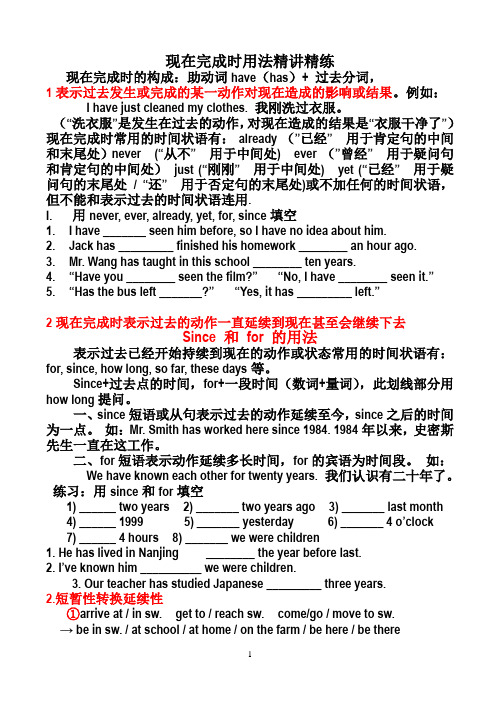
现在完成时用法精讲精练现在完成时的构成:助动词have(has)+ 过去分词,1表示过去发生或完成的某一动作对现在造成的影响或结果。
例如:I have just cleaned my clothes. 我刚洗过衣服。
(“洗衣服”是发生在过去的动作,对现在造成的结果是“衣服干净了”)现在完成时常用的时间状语有:already (”已经” 用于肯定句的中间和末尾处)never (“从不” 用于中间处)ever (”曾经” 用于疑问句和肯定句的中间处)just (“刚刚” 用于中间处)yet (“已经” 用于疑问句的末尾处/ “还” 用于否定句的末尾处)或不加任何的时间状语,但不能和表示过去的时间状语连用.I.用never, ever, already, yet, for, since填空1. I have _______ seen him before, so I have no idea about him.2. Jack has _________ finished his homework ________ an hour ago.3. Mr. Wang has taught in this school ________ ten years.4. “Have you ________ seen the film?” “No, I have ________ seen it.”5. “Has the bus left _______?” “Yes, it has _________ left.”2现在完成时表示过去的动作一直延续到现在甚至会继续下去Since 和for 的用法表示过去已经开始持续到现在的动作或状态常用的时间状语有:for, since, how long, so far, these days等。
Since+过去点的时间,for+一段时间(数词+量词),此划线部分用how long提问。
英语16大时态电子图(1)
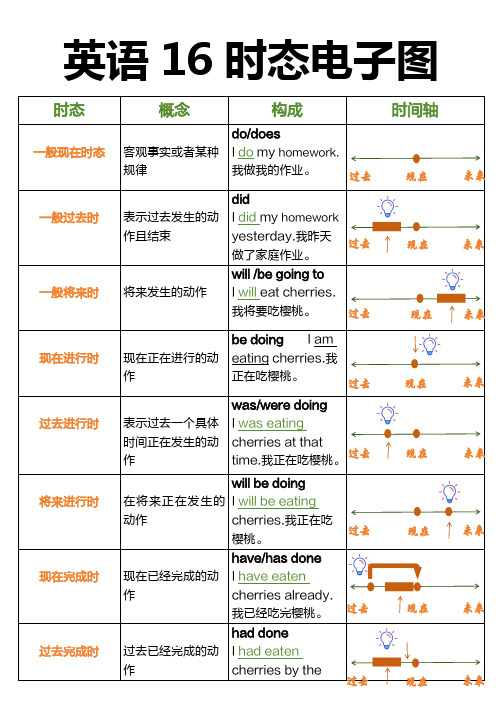
英语16时态电子图未来现在过去过去未来未来未来时态、时间现在过去将来过去将来一般时态do/does did will do Would do进行时态am/is/aredoing were/wasdoingwill be doing Would bedoing完成时态have/hasdone had done will have done Would havedone完成进行时态have beendoing had beendoingwill have beendoingWould havebeen doing二、常见时态标志词时态标志词一般现在时态every time每次in the morning早上once a week每周一次twice a month每月两次hardly ever几乎不every Sunday每个周日always总是usually通常often经常sometimes有时every day每天一般过去时ago以前yesterday昨天the day before yesterday前天last time上次last night昨晚last year去年last term上学期last Monday上周一once upon a time曾经(1)in+过去的时间过去某时in the early days在早期just now刚才一般将来时tomorrow明天the day after tomorrow后天next time下次next Friday下周五next month下个月next term下学期in+一段时间多久之后soon很快sooner or later迟早at once立刻by the end of+将来时间现在进行时look看listen听at this time此时at this moment此时at present现在right now现在过去进行时at that time在那时at that moment在那时将来进行时tomorrow,the day after tomorrow;soon;next week/month/year/...;the week/month/year现在完成时already已经yet还just刚才never从不ever曾经before以前up to now目前为止so far目前为止for+一段时间since+过去未来某一时间过去完成时by+过去时间点by the time到..时候为止by then到那时候by last time最后一次by the end of last week到了上周末before+过去时间点(3)up until+过去时间点up until then直到那时up until last time直到上次将来完成时the day after tomorrow;soon;next过去将来时the following month下个月the next time下次the next Friday 下周五the next term下学期三、被动语态主动语态被动语态一般时现在:do/does现在:be/is/are done过去:did过去:was/were done将来:will/shall do将来:will/shall be done 过去将来:would do过去将来:would be done进行时现在:am/is/are doing现在:am/is/are being done 过去:was/were doing过去:was/were being done完成时现在:have/has done现在:have/has been done过去:had done过去:had been done将来:will have done将来:will have been done过去将来:would have done过去将来:would have been done四、其他语法8类代词人称代词I、you、they、it(第一、第二、第三人称转换)物主代词my、his、their、mine、hers反身代词myself、ourselves、oneself相互代词each other、one another指示代词this、that、these、such、same疑问代词who、whom、whose、which、what关系代词who、whom、whose、which、that不定代词some、any、no、all、one、every、many、a little…8种句子结构主+谓He runs.他跑。
现在完成时与过去完成时讲解

现在完成时1.现在完成时态表示过去发生的动作对现在造成的影响或结果。
本时态标志词:already (“已经”,用于肯定句中,放在have /has之后或句尾);yet (“仍然”“还”,用于疑问句或否定句的句尾)just(“刚刚”,放在have /has之后);before(“以前”,放在句尾);ever(“曾经”,放在have /has之后)never (“从没有”,在have /has之后)例句:1.Our teacher has just left.2.We have studied English already.3.I have not finished the homework yet.4.He has never been to Beijing before.例:I have just turned off the light. 我刚刚把灯关上。
(结果是灯已经关上了)She has lost her bike. 她把自行车丢了。
(影响是他现在没有自行车骑了)The rain has stopped now. 雨已经停了。
(结果是我们可以出门了)I have already read the book. 我已读过这本书了。
(结果是已知道这本书的内容)She has had a good education. 她受到过良好的教育。
(影响是她文化水平高,有修养)2.某个动作从过去已经开始,一直持续到现在,还有可能持续到将来.(也可能不继续下去),常同包括现在在内的时间状语连用,如:today, now, this week, this morning, these days, this afternoon, recently, so far等动作的持续性要通过一段时间来表示一段时间的表达方法有两种:for: +一段时间 for a year for two weeks for three yearsSince +过去的某一时刻, since nine since last weekSince +一般过去时态的时间状语从句 since you came ; since you got hom e.例:We have had much snow this winter. 今年冬天多雪。
初中现在完成时及现在完成进行时讲解及练习[1]
![初中现在完成时及现在完成进行时讲解及练习[1]](https://img.taocdn.com/s3/m/aaee124c763231126edb1161.png)
一.现在完成时的构成:现在完成时由助动词have(has)+动词的过去分词构成。
has用于第三人称单数,have用于其他各种人称.二.现在完成时的用法:其用法主要有三种I.“已完成”用法 :表示一个过去发生并结束的动作对现在造成的影响或结果。
这一类情况可以细致分为下述两种情况。
1)表示开始于过去的动作刚刚结束。
常和just,now,already,yet,not…yet等不确定的时间状语连用。
Li Ming has just turned off the light. 李明刚刚把灯关上。
(说明现在灯关上了)I've finished my homework now. 现在我已经做完作业了。
(说明可以交作业或做别的了)2)表示过去动作的结果,现在仍残留着。
一般不用时间状语。
I have lost my pen. 我把笔丢了。
(说明过去某时丢的,现在我还没找到这支笔)She has become a teacher. 她已经当了老师。
(说明她现在仍是老师)II.“未完成”用法。
表示动作或状态从过去某时开始,持续到现在,可能继续下去,也可能刚刚结束。
常和表示一段时间的状语连用。
如today,this week(month),lately,recently,these days,in the past few days,during the last two weeks,since,since yesterday,since 2 days ago,since 1991,for a long time,for a month,so far,up to now,till(until)now等。
He has lived here for 30 years. 他住在这儿三十年了。
(现在还住在这儿)They've known each other since childhood. 他们从小彼此相识。
现在完成时态讲解(一)

现在完成时态讲解与练习(一)一、句式构成:肯定式:主语+ have/has + 过去分词+其他否定式:主语+ haven't/hasn't + 过去分词+ 其他。
疑问式: Have /Has + 主语+ 过去分词+ 其他?简略答语: (肯定)Yes, 主语+ have/has.(否定)No, 主语+ haven't/hasn't.(否定)二、用法现在完成时表示过去发生或已经完成的动作对现在造成的影响或结果,常与时间副词already(已经),yet(还、已经),just(刚刚、仅仅) ,ever(曾经),never(从不),before(以前)等连用。
(一)肯定句:主语+ have/has + 过去分词+ 其他。
如:(1)We have cleaned the classroom.(我们已经打扫了教室,意味着教室现在是干净的。
)(2)She has bought the book already.(她已经买了这本书,意味着她现在有这本书)(当主语是第三人称单数时用has,其余人称用have, 此处have/has 为助动词。
)(二)否定式:主语+ haven't/hasn't (或have/has never)+过去分词+其他。
Eg:(1)I haven’t been to Beijing.我没去过北京。
(2)He hasn’t finished his homework. 他还没有完成他的家庭作业。
(三)疑问式: Have /Has + 主语+ 过去分词+ 其他?简略答语: Yes, 主语+ have/has.(肯定)No, 主语+ haven't/hasn't.(否定)例:(1).He has seen the film.改为否定句:改为一般疑问句并做肯定和否定回答:(2)I have finished my homework.改为否定句:改为一般疑问句并做肯定和否定回答:三、过去分词变换规则*过去分词的形式,规则动词的过去分词构成与动词过去式相同,变换规则如下:1》直接+ed f inish-finished-finished,2》以e结尾直接+d live-lived-lived3》以辅音字母加y 结尾变y为i+ed study-studied-studied,4》双写最后一个辅音字母+ed plan-planned-planned;5》不规则动词需要特殊记忆,见课本145-146页。
最新常见时态的标志词(重点现在完成时) (1)
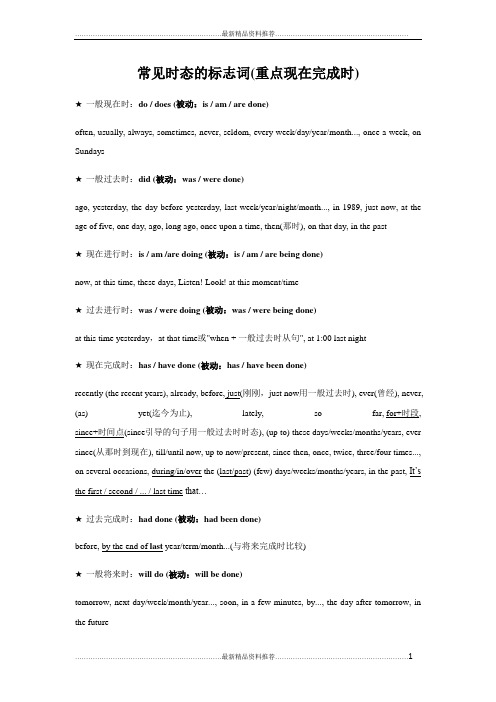
常见时态的标志词(重点现在完成时)★一般现在时:do / does (被动:is / am / are done)often, usually, always, sometimes, never, seldom, every week/day/year/month..., once a week, on Sundays★一般过去时:did (被动:was / were done)ago, yesterday, the day before yesterday, last week/year/night/month..., in 1989, just now, at the age of five, one day, ago, long ago, once upon a time, then(那时), on that day, in the past★现在进行时:is / am /are doing (被动:is / am / are being done)now, at this time, these days, Listen! Look! at this moment/time★过去进行时:was / were doing (被动:was / were being done)at this time yesterday,at that time或"when + 一般过去时从句", at 1:00 last night★现在完成时:has / have done (被动:has / have been done)recently (the recent years), already, before, just(刚刚,just now用一般过去时), ever(曾经), never, (as) yet(迄今为止), lately, so far, for+时段, since+时间点(since引导的句子用一般过去时时态), (up to) these days/weeks/months/years, ever since(从那时到现在), till/until now, up to now/present, since then, once, twice, three/four times..., on several occasions, during/in/over the (last/past) (few) days/weeks/months/years, in the past, It’s the first / second / ... / last time that…★过去完成时:had done (被动:had been done)before, by the end of last year/term/month...(与将来完成时比较)★一般将来时:will do (被动:will be done)tomorrow, next day/week/month/year..., soon, in a few minutes, by..., the day after tomorrow, in the future★过去将来时:would do (被动:would be done)the next day/morning/year..., the following month/week...★将来完成时:will have done (被动:will have been done)by the end of next week/term/month...(与过去完成时比较)人工智能技术及其发展趋势1.关于专用人工智能与通用人工智能,下列表述不当的是()。
现在完成时、现在完成进行时、过去完成时、过去将来时
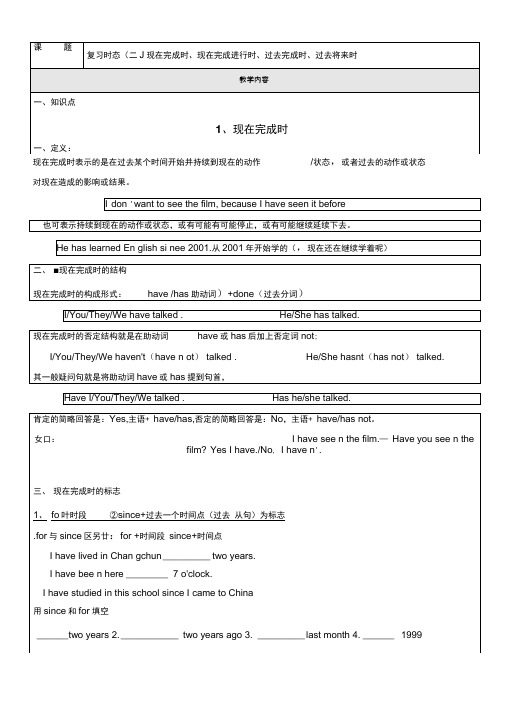
现在完成时表示的是在过去某个时间开始并持续到现在的动作/状态,或者过去的动作或状态对现在造成的影响或结果。
leave --- be away borrow --- keep buy --- h avedie --- be dead finish --- be over fall ill--■-be illget up---be up catch a cold --- have a coldgo there --- be there become --- befall asleep --- be asleep get to/ arrive/reach --- b e (in)get to know --- know go (get) out—be out put or—wearjoin----be a member of ... (成为…的一贝)ope n ---be openbegi n/start --- be oncome here --- be here come back --- be back leave --- be away fromclose ---be closedI have already fini shed my homework. already用在 _______ ,位于 _________ 。
“已经”Have you finished your homework yet? yet用在__________ 和_________ 中,位于__________ 。
“仍然,已经”3)so far(目前;迄今为止)up to now=till now=by now 至U现在为止;直至U现在recently最近by the end of …至U …末/ 结束by the end of this year 至U 今年年末by the end of this mon th 到本月末in the last /past mon ths在过去的几个月中in the past/last few days/years在过去的这几天4、用于现在完成时的句型1) It is the first / seco nd time that+ 现在完成时。
英语专题汇编现在完成进行时(一)含解析

英语专题汇编现在完成进行时(一)含解析一、单项选择现在完成进行时1.---Alice, what’s wrong with you? You look so worn out.---Nothing serious. I my new house all day and I’m afraid I won’t finish until tomorrow afternoon.A.have whitewashed B.am whitewashingC.have been whitewashing D.shall be whitewashing【答案】C【解析】考查时态:句意:---爱丽丝,你怎么了?你看起来很疲劳啊。
--没什么严重的,我一天一直在粉刷房子,恐怕明天下午才能完成。
用现在完成进行时,表示动作从过去一直延续到现在,可能还要继续。
选C。
2.—I _______ the dishes for over a week. It’s your turn.— I ______ you would say something like that.A.have washed; have known B.have been washing; knewC.have washed; know D.have been washing; know【答案】B【解析】试题分析:句意:——我洗盘子洗了一周了。
该轮到你了。
——我知道你就会这样说。
现在完成时与现在完成进行时的区别是:现在完成时指到目前为止已经结束的动作,现在完成进行时指一直持续的动作,从语境可知此处强调持续,所以用现在完成进行时,排除A、C 选项,而根据宾语从句中的would可以推测主句应该用过去时态,答案选B。
考点:考查动词时态。
3.Since the time humankind started gardening, we _____to make our environment more beautiful.A.try B.have been tryingC.are trying D.will try【答案】B【解析】试题分析:考查动词时态。
现在完成时被动语态(1)
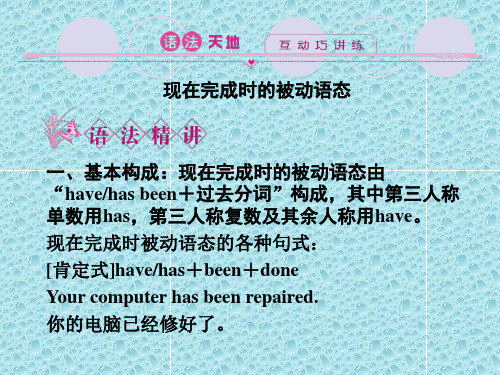
B.have been shown
C.were shown
D.will be shown
解析: 考查时态及语态。由时间状语till now “直 到现在”可知用现在完成时,又因film与show之间是 被动关系,故用现在完成时的被动语态。
答案: B
4.Every possible means________to save the
答案: has been translated
Ⅱ.单项填空
1.—Is the meeting held in Room 302 or 303?
—It should be 302.But I hear that it________till
tomorrow.
A.was put off
B.will put off
点津:这类动词的否定式可表示动作的持续过程,具 有持续性,因而可与since或for构成的时间状语连用。
(2010·福建卷)Every year a flood of farmers
arrive in Shenzhen for the moneymaking jobs
they________before leaving their hometowns.
A.had changed
B.will change
C.was changed
D.has been changed
解析: 考查动词时态、语态。句意为:尽管我们不 知道讨论的内容,但我们能感觉到讨论的话题变了。 根据题意,句子应用被动结构,排除A项和B项,又根 据时态一致,排除C项。
答案: D
Ⅰ.用所给词的适当形式填空
7.Since the cause of this disease________ ________ ________(discover),now we need to develop the
(最新整理)一般过去时、现在完成时与一般现在时的区别(1)

He came here yesterday.
2021/7/26
3
• 现在完成时表示过去的动作(或状态)对现在
产生的影响和结果.常与ever, never, before , twice, already ,just, yet, so far, since, for , up to now, in past years 等, 皆不确定或模糊的时间状语连用。
--- He has been a soldier for a year. 202-1-/7-/2H6e has been in the army for a year.
--- It is a year since he joined the army.
(keys)
延 续 性 动 词 和 瞬 间 性 动 词 之 间 的 转 化
10. He joined the army last year.
--- He ____ ____ a ____ for a year.
-2-0-2H1/7e/2_6 ___ ____ ____ the army for a year.
13
--- It ____ a year ____ he joined the army.
They usually go to school by bike. I take the medicine three times a day. She helps her mother once a week. He often watches Tv.
Mary likes reading interesting stories
I have been to Shanghai twice . 我曾去过上海两次.
英语时态详解(一)

英语时态详解(一)英语时态详解一、现在时态(Present Tense)1.简单现在时(Simple Present Tense)–表示客观事实、经常性的行为、习惯或普遍真理。
–示例:I study English every day. (我每天学英语。
)2.现在进行时(Present Continuous Tense)–表示当前正在进行的动作。
–示例:She is studying for her exam now.(她正在备考。
)3.现在完成时(Present Perfect Tense)–表示过去发生的动作对现在产生的影响,或过去开始的但持续到现在的动作。
–示例:I have finished my work.(我已经完成了我的工作。
)二、过去时态(Past Tense)1.简单过去时(Simple Past Tense)–表示过去某个时间发生的动作或状态。
–示例:He played basketball yesterday.(他昨天打篮球。
)2.过去进行时(Past Continuous Tense)–表示过去某个时间正在进行的动作。
–示例:They were watching a movie at 9 last night.(昨晚九点他们在看电影。
)3.过去完成时(Past Perfect Tense)–表示过去某个时间之前发生的动作。
–示例:She had already left when I arrived.(我到达时她已经离开了。
)三、将来时态(Future Tense)1.简单将来时(Simple Future Tense)–表示将来某个时间要发生的动作或状态。
–示例:I will visit my parents next week.(下周我将拜访我的父母。
)2.将来进行时(Future Continuous Tense)–表示将来某个时间正在进行的动作。
–示例:I will be studying at this time tomorrow.(明天这个时候我将在学习。
现在完成时态的结构和用法
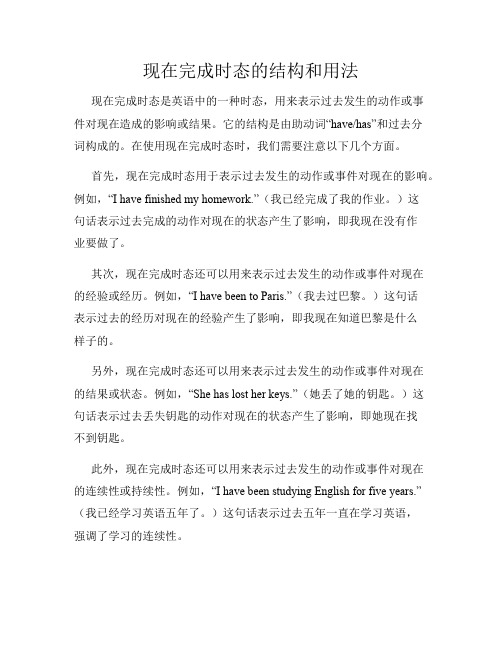
现在完成时态的结构和用法现在完成时态是英语中的一种时态,用来表示过去发生的动作或事件对现在造成的影响或结果。
它的结构是由助动词“have/has”和过去分词构成的。
在使用现在完成时态时,我们需要注意以下几个方面。
首先,现在完成时态用于表示过去发生的动作或事件对现在的影响。
例如,“I have finished my homework.”(我已经完成了我的作业。
)这句话表示过去完成的动作对现在的状态产生了影响,即我现在没有作业要做了。
其次,现在完成时态还可以用来表示过去发生的动作或事件对现在的经验或经历。
例如,“I have been to Paris.”(我去过巴黎。
)这句话表示过去的经历对现在的经验产生了影响,即我现在知道巴黎是什么样子的。
另外,现在完成时态还可以用来表示过去发生的动作或事件对现在的结果或状态。
例如,“She has lost her keys.”(她丢了她的钥匙。
)这句话表示过去丢失钥匙的动作对现在的状态产生了影响,即她现在找不到钥匙。
此外,现在完成时态还可以用来表示过去发生的动作或事件对现在的连续性或持续性。
例如,“I have been studying English for five years.”(我已经学习英语五年了。
)这句话表示过去五年一直在学习英语,强调了学习的连续性。
需要注意的是,现在完成时态通常与表示时间段的状语连用,如“for”和“since”。
例如,“I have lived in this city for ten years.”(我在这个城市住了十年了。
)这句话表示我在这个城市住了十年,并强调了住的时间段。
此外,现在完成时态还可以与一些表示经验或经历的词语连用,如“ever”和“never”。
例如,“Have you ever been to Japan?”(你去过日本吗?)这句话表示对过去的经历进行提问。
总之,现在完成时态是英语中一种重要的时态,用来表示过去发生的动作或事件对现在的影响、经验、结果或连续性。
新概念英语第一册Lesson85-86
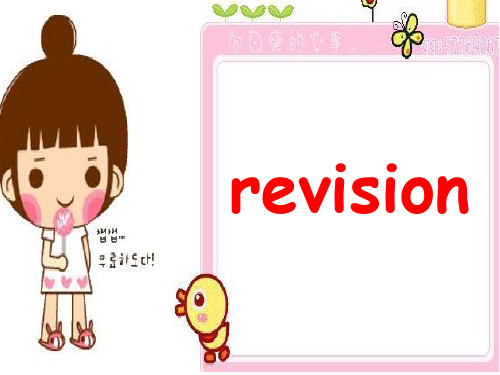
Ken: Paris is a beautiful city. George: I’ve never been there. Have you ever been there,Ken? Ken: Yes, I have. I was there in April.
George: Paris in the spring,eh? Ken: It was spring, but the weather was awful. It rained all the time. George: Just like Lodon!
George: What’s on? Ken: ‘Paris in the spring’. George: Oh, I’ve already seen it. I saw it on television last year. It’s an old film, but it’s very good.
• What's the name of the film? • Paris in the spring. • When did Ken visit Paris? • In spring/April.
Note on the text
1.Have you just been to the cinema? 你刚去过电影院吗?
(Triumphal Arch [trai'Λmfel a:k]) 巴黎凯旋门
凯旋门坐落在巴黎西北 面的戴高乐广场,12条大街以 它为中心放射形散开,因此, 戴高乐广场也称星际广场。 凯旋门的建造,始于古罗马。 1806年2月22日,拿破仑一世 在欧斯代尔利茨战役中打败 了奥俄联军,凯旋回国,经过 星际广场,在国民的欢呼声中, 从而得名。
(英语)初中英语专题汇编英语现在完成进行时(一)及解析

(英语)初中英语专题汇编英语现在完成进行时(一)及解析一、初中英语现在完成进行时1.______ her ambition of becoming a professional singer, she _____ very hard since an early age.A. To realize, has been trainingB. Realizing, trainedC. To realize, was trainedD. Realized, has trained【答案】 A【解析】【分析】句意:为了实现成为职业歌手的志向,她从小就一直很努力地训练。
本题第一空中使用不定式做目的状语,第二句时间状语since an early age通常和现在完成时连用,表示从过去就开始的动作,本句使用现在完成进行时强调动作的延续性,表示她一直都在努力训练。
故A项正确。
【点评】考查非谓语动词和时态,本题涉及不定式作目的状语和现在完成进行时的应用。
2.Have you ever _______ with a group?A. to speakB. studyC. studyingD. studied【答案】 D【解析】【分析】句意:你曾经有过小组学习吗?现在完成时的结构:have+过去分词,故选D。
【点评】考查现在完成时的结构。
3.—Can Mr Read speak Chinese?—Yes.He speaks Chinese very well because he China for many years.A. has been inB. has been toC. has gone toD. has come to【答案】A【解析】【分析】句意为:--里德先生会说中文吗?---是的。
他汉语说得很好因为他已经在中国多年。
has been in 指的是某人在某地停留多长时间;has been to是去过某地已经回来;has gone to是去某地了,还没回来;has come to是已经来到某地,根据句意可知选A 【点评】考查动词短语辨析4.We can’t get sleep with a strong wind outside.A. blowB. blowingC. blewD. blows【答案】B【解析】【分析】句意:我们不能睡在外面,外面大风吹。
- 1、下载文档前请自行甄别文档内容的完整性,平台不提供额外的编辑、内容补充、找答案等附加服务。
- 2、"仅部分预览"的文档,不可在线预览部分如存在完整性等问题,可反馈申请退款(可完整预览的文档不适用该条件!)。
- 3、如文档侵犯您的权益,请联系客服反馈,我们会尽快为您处理(人工客服工作时间:9:00-18:30)。
have/has gone
to
have/has been
to
have/has been
in
去了 说话时某人不在 只用于第三人称
去过 常与ever, never, once,twice,连用
在… 与时间段连用 用how long 提问
How long has she lived in London?
4. They have come back from work.
(写否定句)
They haven’t come back from work.
功能:
He has had a big breakfast.
He is full .
1.过去某一时间发生的动作对现在产生影响。
She left this morning.
have/has ge/has been
in
去了 说话时某人不在 只用于第三人称
去过 常与ever, never, once,twice,连用
在… 与时间段连用 用how long 提问
A: Where is Bob ? has gone to Japan with B: He ____________ his sister.
have gone to have been to have been in
去了某地 还没回来 只用于第三人称 去过某地已经回来 常与ever, never, once,twice,连用 一直留在某地 与for / since连用 用how long 提问
has gone to Her sister _____________ Australia,
come-- came come done do-- did got get-- got give-- gave given go-- went gone keep-- kept kept know-- knew known see-- saw seen take-- took taken told tell-- told
Have you ever ________ been to the city ? A: _____
B: No , never .
写出下列单词的过去式及过去分词 be-- was/were been become-- became become begin-- began begun bring-- brought brought build-- built built buy-- bought bought can-- could /
现在完成时
基本结构 have / has + done
助动词 (可以帮助 构成肯定、疑问和 否定句)
1.He has cleaned his room.
(写一个一般疑问句) Has he cleaned his room?
2. She has lived in London
for four years. (划线部分提问)
have/has gone
to
have/has been
to
have/has been
in
去了 说话时某人不在 只用于第三人称
去过 常与ever, never, once,twice,连用
在… 与时间段连用 用how long 提问
have you _______ been in China? A: How long ____
